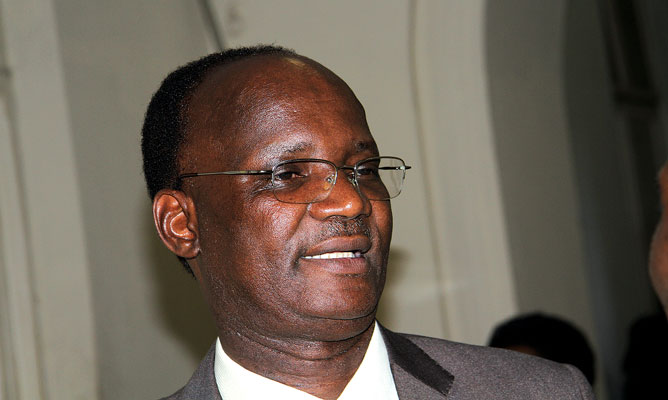
MASVINGO — A ruler that’s not flexible enough to bend will break, once retorted Higher and Tertiary Education minister Jonathan Moyo on his favourite platform, Twitter.
By Tatenda Chitagu
The minister’s advice seems to have been taken to heart by soon-to-be 93-year-old President Robert Mugabe.
Mugabe recently demonstrated the need for flexibility on political decisions in the ruling Zanu PF and government with a timely intervention in Masvingo Province.
He intervened in the contentious allocation of 4 000 hectares of land grabbed from the Johannesburg stock exchange -listed sugar producing giant, Tongaat Hullet and allocated to 213 Zanu PF bigwigs, senior government officials, securocrats and their relatives by government in April last year.
The move touched a raw nerve, with a faction in the ruling party code-named G40 (Generation 40) contesting the land seizures, allegedly done along factional lines after a rival Team Lacoste faction had made the sugar producer its feeding trough by allocating the land to its sympathisers.
Team Lacoste wants Vice-President Emmerson Mnangagwa, nicknamed crocodile, to take over from the ageing Mugabe, while G40 wants to torpedo his ambitions and place first lady Grace Mugabe.
With Tongaat being the latest political battleground by the two warring factions angling to strategically position themselves in the race to succeed Mugabe, G40 went against the grain, choosing instead to side with Tongaat, in defiance of Zanu PF’s unending land reform programme, started in the early 2000 with the invasion of white commercial farmers’ plots by war veterans.
- Chamisa under fire over US$120K donation
- Mavhunga puts DeMbare into Chibuku quarterfinals
- Pension funds bet on Cabora Bassa oilfields
- Councils defy govt fire tender directive
Keep Reading
Largely comprising Young Turks, G40 legislators in Masvingo sought audience with Mugabe in June last year in the capital Harare soon after the offer letters were issued.
They accused Team Lacoste, mainly consisting of the old guard, of doing the partitioning along factional lines.
Citing the land grab as a drawback on the party’s 2013 election manifesto of creating 2,2 million jobs, they said the move was not only disastrous as it would render 2 000 Tongaat workers jobless, according to statistics availed by the Zimbabwe Sugar Milling Industry Workers Union, but would also trigger the collapse of the sugar industry.
for once, Zanu PF members had ominously seen the light, after all the years of chucking out white commercial farmers, conservationists and investors.
It remains to be seen whether they were informed by goodwill or the need to spite the rival faction after being sidelined in the parcelling out of the land.
Mugabe being the shrewd politician who does not want to annoy his old guard, mainly comprising his trusted lieutenants whom he was with during the 1970s liberation war, called for a balanced meeting where both sides were fully constituted.
That meeting, which lasted the whole day, ended inconclusively as Mugabe failed to douse the factional fires. It was held at Triangle country Club last June.
Mugabe did not even have time to address some of the party and government officials who had spent the whole day waiting for him.
He left in a huff after the heated, no-holds-barred meeting punctuated by barbs and tears.
The late vice-president Simon Muzenda’s son, who is the Gutu North legislator, Tongai, wept in front of Mugabe over his alleged bullying by senior Masvingo members following the death of his father.
Tongaat Hullet sponsored the event, providing the venue, food and drinks.
Another meeting was arranged at State House in Harare the following week.
At the third meeting, Mugabe reprimanded both factions, but dribbled past them as he called for unity, without categorically stating whether the offer letters should be revoked or not, sources who were in attendance but claimed to be “non-aligned”, said.
Both factions were claiming victory after the meeting.
After the back-to-back meetings, the G40 members in Masvingo, with the support of acting chairperson Amasa Nhenjana, held a rally in Triangle to brief members of the outcome of the final meeting with Mugabe.
In September and October, the 40 parliamentarians, with Zanu PF legislator Darlington Chiwa in the forefront, mobilised for several demos which were, however, banned. They only met in halls where they addressed workers and called for the return of the plots to the South African business concern.
Realising that the demos were not working, the G40 faction dug in, playing their trump card by courting South African President Jacob Zuma, through the country’s ambassador in Zimbabwe, who intervened and came to Harare in November to have audience with Mugabe over the issue.
After the meeting, Mugabe finally gave in and ordered the withdrawal of the offer letters.
In November, Lands minister Douglas Mombeshora wrote letters of notices to withdraw the offer of land as per procedure.
On December 12 Mombeshora withdrew the offer letters.
It could not be established yesterday how many had had their offer letters withdrawn as both Mombeshora and Masvingo Provincial Affairs minister Shuvai Mahofa could not be reached for comment as their mobile phones went unanswered.
G40 faction members celebrated, while Team Lacoste cried foul, saying the reversal had left them in a quandary.
Some of the beneficiaries had borrowed heavily from banks and offered their immovable properties as collateral to fund the farming operations.
Last Thursday, 174 farmers, through the Lowveld Sugarcane Growers Association, filed an urgent chamber application for an interdict. They want to be allowed to harvest and are demanding government compensation.











